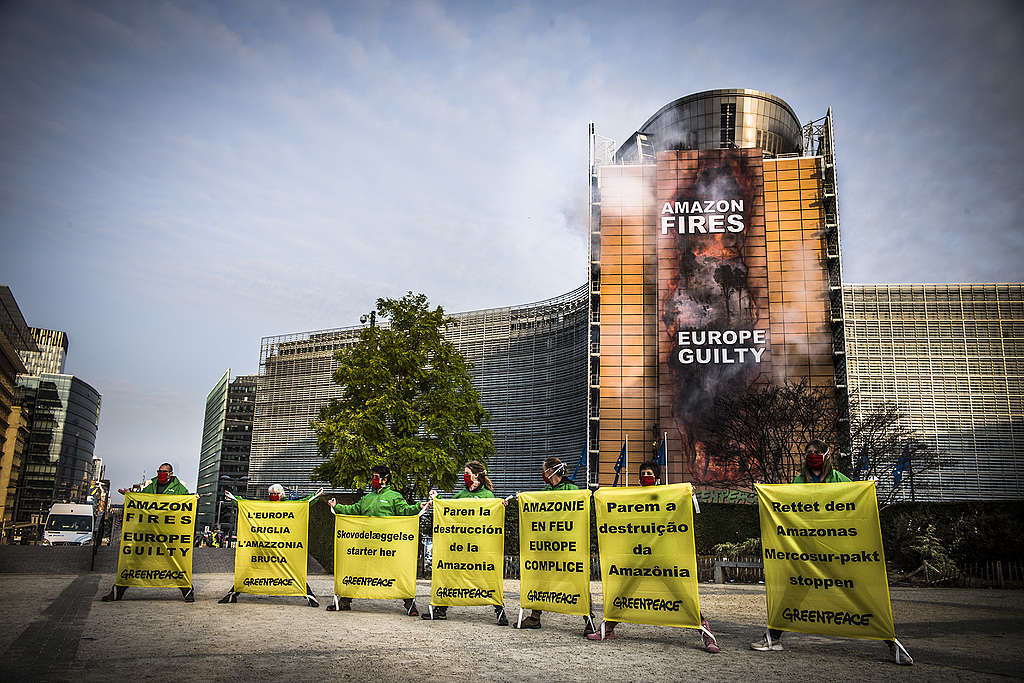Brussels – The European Parliament has voted in favour of a strong new EU anti-deforestation law, which would for the first time ban products linked to the destruction of forests and human rights violations.

The vote took place as the Brazilian Amazon suffered the highest number of illegal fires since 2010, with deforestation rates reaching record levels, and as a recent European poll found that 82% of respondents believe businesses should not sell products that destroy the world’s forests, while 78% believe governments should ban products from deforested areas.
Greenpeace EU forest campaigner Sini Eräjää said: “Nobody wants to worry that their weekly shop might be linked to death and destruction – the vote today is a big step towards breaking that link. With overwhelming public support and now political momentum, the only thing standing in the way of eradicating the destruction of forests and human rights abuses from the EU market is governments covering for the companies who refuse to clean up their act.”
In contrast to the weak position of EU governments, the European Parliament voted in favour of the following key measures to strengthen the draft law tabled by the European Commission:
– more robust definitions of deforestation and forest degradation, which will ensure greater protection of forests from agricultural expansion and destructive logging practices;
– stronger protection of human rights, especially the rights of Indigenous Peoples and local communities, which are often violated when ecosystems are destroyed;
– a broader list of commodities and products covered by the law – adding rubber, maize and other livestock (pigs, sheep, goats and poultry) to the six commodities proposed by the Commission (palm oil, soy, coffee, cocoa, cattle and wood) – and resisting pressure to exclude leather;
– extending the law to cover European financial institutions, whose investment portfolios would need to be vetted for links to projects and companies causing forest destruction.
The Parliament also joined the Commission and national governments in backing the need to trace products back to the source, including with the use of geolocation, to verify they are not from deforested areas, and ruled out any exemptions or special treatment for products covered by voluntary certification schemes.
Despite these steps forward to protect forests, other ecosystems such as savannahs and wetlands remain under threat from agricultural expansion and the impact of EU consumption. However, the Parliament approved a review clause that would allow the Commission to widen protection to all natural ecosystems in the coming year.
Following the vote today, three-way negotiations on the final law will begin between the European Parliament, national governments and the European Commission. Forest degradation is likely to be a hot topic in the negotiations. The Czech government, who hold the rotating presidency of the EU, will lead talks on behalf of governments and is under pressure to conclude the negotiations in time for UN climate and biodiversity summits towards the end of 2022.
Note: More information on the draft EU anti-deforestation law.
Contacts:
Sini Eräjää, Greenpeace European food and forest campaign lead: +32 (0)476 975960, [email protected]
Greenpeace EU press desk: +32 (0)2 274 1911, [email protected]
For breaking news and comment on EU affairs: www.twitter.com/GreenpeaceEU
Greenpeace is an independent global campaigning network that acts to change attitudes and behaviour, to protect and conserve the environment and to promote peace. We do not accept donations from governments, the EU, businesses or political parties. Greenpeace has over three million supporters, and 26 independent national and regional organisations with offices in more than 55 countries.
EU Transparency Register: 9832909575-41
